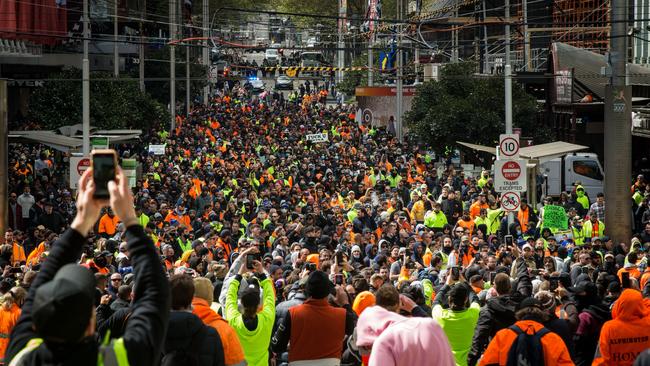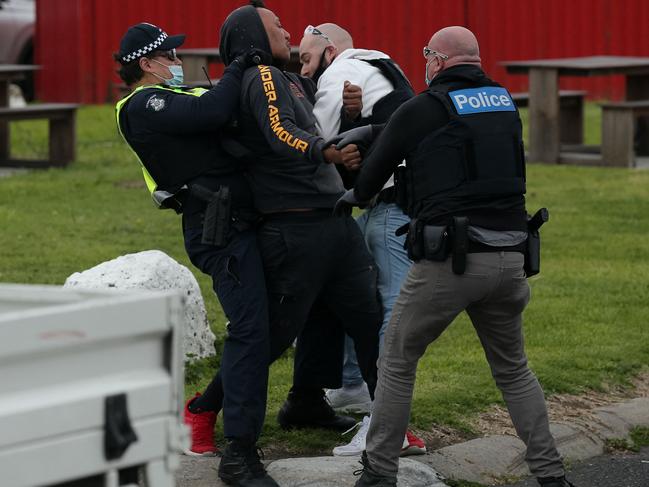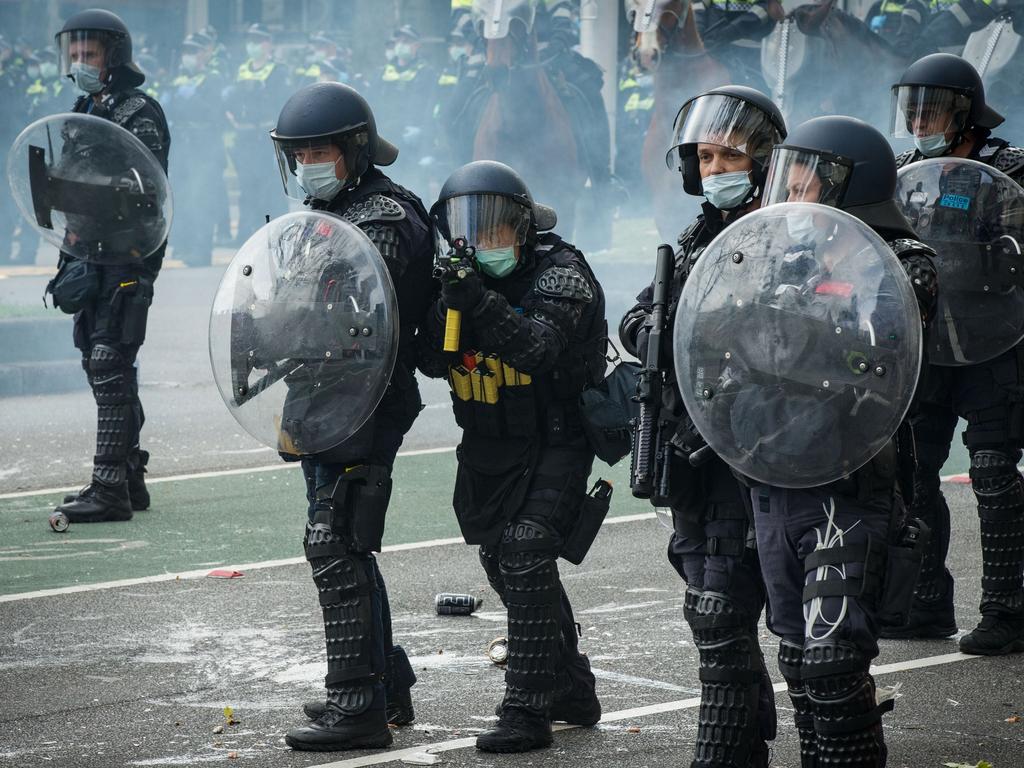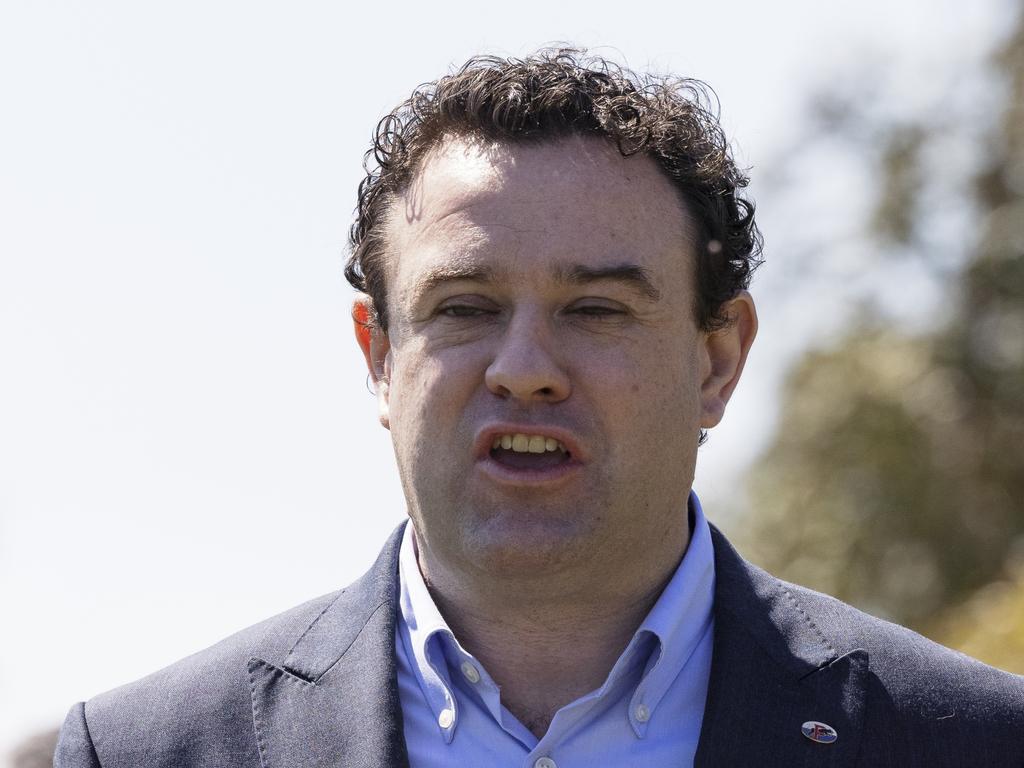Building workers ditch health and safety for Covid

Strikes over safety have shut industries and produced big improvements in conditions. Strikes over trivial issues such as a shortage of ice cream flavours available in the crib room of major mines have highlighted the absurdity of union behaviour. But rioting in the streets for the right to reject vaccination and potentially infect co-workers with Covid-19 represents a new low for workers in the militant union movement. Two days of confrontation with heavily armed police in Melbourne have split unions, their members and the hierarchy of organised labour. It has added a new layer of complexity to the already difficult challenge of getting Australia’s second biggest city out of what is heading towards becoming the world’s longest period of pandemic lockdown.

Until now, construction workers in Melbourne had been largely shielded from many of the restrictions imposed under lockdown. But a high rate of infections on building sites and a refusal by workers to accept a government demand for mandatory vaccinations has resulted in the complete closure of Melbourne’s building industry for two weeks, at an estimated cost of $455m a day. Victorian Health Minister, Martin Foley said authorities had been forced to act because there were 337 active cases directly linked to the construction sector across 154 sites. Of these, 239 cases were linked to sites in metropolitan Melbourne. Nine of these cases lived in regional Victoria, primarily in the locked-down regions of Ballarat, Geelong and Mitchell Shire.
The closure of building sites has added to explosive tensions within the union movement over mandatory vaccination for some workers. The ACTU has supported business leaders in a joint approach that mandatory vaccinations be implemented only through the use of nationally consistent public health orders. In a joint statement on August 13, the ACTU and the Business Council of Australia said they acknowledged that the federal government’s Covid-19 vaccination policy was that it should be free and voluntary. “Employers and unions recognise that for a small number of high-risk workplaces there may be a need for all workers in a workplace to be vaccinated to protect community health and safety,” the statement said. “These are serious decisions that should not be left to individual employers and should only be made following public health advice based on risk and medical evidence.”
The BCA has criticised the decision to close the Victorian construction industry, while ACTU secretary Sally McManus has attempted to dismiss the heated protests on Monday as being led by “violent anti-vaxxer extremists”. But the socialist wing of the labour movement, Solidarity, has been campaigning against the ACTU on the issue, criticising it for “doing nothing to oppose mandatory vaccination”. “The union could have organised for health workers to tour construction sites, talking to workers about their concerns and administering vaccinations,” the group said. “Instead it has allowed the government to force them into it.” As the protests have spun out of control, other unions have attacked the building workers. In a strongly worded statement, Australian Nursing and Midwifery Federation Victorian branch secretary Lisa Fitzpatrick called on the protesters to “stop thinking only of themselves, stop the violence and put the health and welfare of the Victorian community first”. She said nurses, midwives and carers were “exhausted and frustrated as they watch protesters fight for their right to overwhelm our health system”. The building industry group of unions say they have never supported mandatory vaccinations.
With large numbers of protesters roaming the city, many without masks, Daniel Andrews now presides over a state potentially on the verge of chaos. Once again it is difficult to not make comparisons with the situation in NSW, where employer groups actively have sought to deliver vaccinations to workers on building sites around the city. NSW Premier Gladys Berejiklian has let the building industry know it is not exempt from Covid measures and as a result will be able to return the sector to full capacity from Monday in recognition of the industry’s strong vaccine uptake.






Building workers have a long history of walking off the job at a moment’s notice for concerns about health and safety in the workplace. A mass strike of 35,000 building workers in 1971 led to the creation of a workers compensation scheme that paved the way for other industries. Strike action won the right for Brisbane workers to down tools when the temperature reached 28C and humidity was 75 per cent or higher three hours or more from the start of a shift. The policy also applies when the temperature reaches 35C – irrespective of the humidity level – which is consistent with guidelines in other states. Across one two-year period, from 2017 to 2019, the building unions were slapped with almost $8m in penalties and fines for more than 800 breaches of the law over almost 40 separate court cases. One Federal Court judge was so appalled by the CFMEU’s record of behaviour in 2017 that he described the union as “the most recidivist corporate offender in Australian history”.